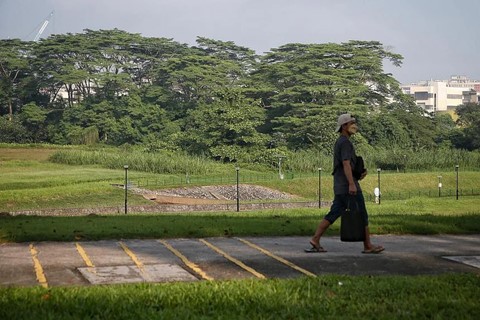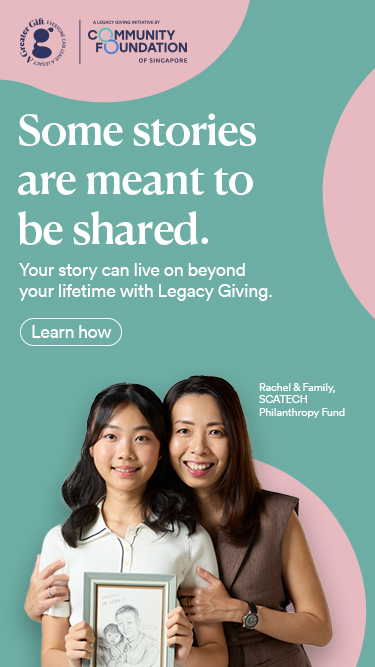More philanthropy funds focusing on climate change needed: Reports


To support green causes and efforts to further climate action, Mr David Heng, chief executive of a private equity fund, set up the Mind the Gap 200 – Sustainable Earth fund in 2019.
It is part of a project Mr Heng, who is in his 50s, undertook with nine friends and the Community Foundation of Singapore.
The fund, which supports charities and programmes that address some of the United Nations’ sustainable development goals, is one of the few set up by philanthropists to tackle climate change.
The cause attracts less than 2 per cent of philanthropic giving globally, according to global non-governmental organisation ClimateWorks Foundation.
A recently published 110-page guide by investment bank UBS is looking to change this by showing donors, philanthropists and investors how to fill the climate funding gap, and the benefits and impacts of “green philanthropy”.
The report, called On Thin Ice, comprises insights and tips from more than 40 experts in the areas of sustainability and investment.
The report also emphasises the importance of prioritising climate funding since the dangerous impacts of climate change will cut across other focus areas such as children’s health, mental well-being, inequality and food security.
“While the need to engage directly with climate change is now recognised, many who may have the means to take action are unclear on how to best use these resources to achieve the greatest impact,” said Ms Hannah Wood, one of the authors of the report.
Ms Wood, programme director of UBS Optimus Foundation, added that areas that need funding include the energy transition, agriculture and climate research.
“Investors may wish to consider investing in key sectors such as renewable energy and carbon capture, energy efficiency and smart mobility.”
Shifting to renewable energy and scaling up research are expensive. The International Energy Agency estimates that 70 per cent of clean energy investments over the next decade need to come from private investors, consumers and financiers.
Limiting global warming to 1.5 deg C by 2030 will require an extra US$4 trillion ($5.5 trillion) investment in clean energy projects and infrastructure every year.
Beyond money, philanthropists and investors can also use their influence as shareholders to push for positive environmental change in companies – especially for firms that are economically important but polluting, added Ms Wood.
ClimateWorks Foundation said that between 2019 and 2020, overall philanthropic giving grew by 3 per cent while climate funding grew by 14 per cent.
Mr Heng is the founder and CEO of $405 million impact investment fund ABC World Asia.
Impact investment funds aim to generate positive environmental and social impact while bringing good returns to investors.
For Mind the Gap 200, people can donate to it through the Community Foundation of Singapore, a charity that encourages and helps to enable philanthropy in Singapore by matching donors’ interests with various causes.
Ms Catherine Loh, chief executive of Community Foundation of Singapore, said interest in green philanthropy picked up here when the Singapore Green Plan 2030 – a movement to advance the national agenda for sustainable development – was announced early last year.
From this year to 2024, the foundation will prioritise five issues for grant-making, and one of them is climate and environment.
This covers environmental conservation efforts, research into climate-related phenomena and climate solutions, added Ms Loh.
“The inclusion of this as an area of focus stems from the recognition that a healthy natural environment is conducive to the well-being of a community,” she said.
She cited the Khurana Nurture Foundation, which supports the Institute of Technical Education’s green ambassadors, training them to be the next generation of environmental activists.
The philanthropic organisation also helps people with disabilities pursue a career in urban farming.
Those philanthropy efforts together address climate action, education, social welfare and jobs.
Charitable family foundations The Straits Times contacted declined to be interviewed because they prefer to keep a low profile about their philanthropic work.
Ms Wood said: “There are big returns to be made from environmental philanthropic and sustainable investments, and as the pace of change continues to speed up, the wisest will be out ahead of the curve driving the transition.”
This article was originally published in The Straits Times here. Source: The Straits Times © SPH Media Limited. Permission required for reproduction.
To support green causes and efforts to further climate action, Mr David Heng, chief executive of a private equity fund, set up the Mind the Gap 200 – Sustainable Earth fund in 2019.
It is part of a project Mr Heng, who is in his 50s, undertook with nine friends and the Community Foundation of Singapore.
The fund, which supports charities and programmes that address some of the United Nations’ sustainable development goals, is one of the few set up by philanthropists to tackle climate change.
The cause attracts less than 2 per cent of philanthropic giving globally, according to global non-governmental organisation ClimateWorks Foundation.
A recently published 110-page guide by investment bank UBS is looking to change this by showing donors, philanthropists and investors how to fill the climate funding gap, and the benefits and impacts of “green philanthropy”.
The report, called On Thin Ice, comprises insights and tips from more than 40 experts in the areas of sustainability and investment.
The report also emphasises the importance of prioritising climate funding since the dangerous impacts of climate change will cut across other focus areas such as children’s health, mental well-being, inequality and food security.
“While the need to engage directly with climate change is now recognised, many who may have the means to take action are unclear on how to best use these resources to achieve the greatest impact,” said Ms Hannah Wood, one of the authors of the report.
Ms Wood, programme director of UBS Optimus Foundation, added that areas that need funding include the energy transition, agriculture and climate research.
“Investors may wish to consider investing in key sectors such as renewable energy and carbon capture, energy efficiency and smart mobility.”
Shifting to renewable energy and scaling up research are expensive. The International Energy Agency estimates that 70 per cent of clean energy investments over the next decade need to come from private investors, consumers and financiers.
Limiting global warming to 1.5 deg C by 2030 will require an extra US$4 trillion ($5.5 trillion) investment in clean energy projects and infrastructure every year.
Beyond money, philanthropists and investors can also use their influence as shareholders to push for positive environmental change in companies – especially for firms that are economically important but polluting, added Ms Wood.
ClimateWorks Foundation said that between 2019 and 2020, overall philanthropic giving grew by 3 per cent while climate funding grew by 14 per cent.
Mr Heng is the founder and CEO of $405 million impact investment fund ABC World Asia.
Impact investment funds aim to generate positive environmental and social impact while bringing good returns to investors.
For Mind the Gap 200, people can donate to it through the Community Foundation of Singapore, a charity that encourages and helps to enable philanthropy in Singapore by matching donors’ interests with various causes.
Ms Catherine Loh, chief executive of Community Foundation of Singapore, said interest in green philanthropy picked up here when the Singapore Green Plan 2030 – a movement to advance the national agenda for sustainable development – was announced early last year.
From this year to 2024, the foundation will prioritise five issues for grant-making, and one of them is climate and environment.
This covers environmental conservation efforts, research into climate-related phenomena and climate solutions, added Ms Loh.
“The inclusion of this as an area of focus stems from the recognition that a healthy natural environment is conducive to the well-being of a community,” she said.
She cited the Khurana Nurture Foundation, which supports the Institute of Technical Education’s green ambassadors, training them to be the next generation of environmental activists.
The philanthropic organisation also helps people with disabilities pursue a career in urban farming.
Those philanthropy efforts together address climate action, education, social welfare and jobs.
Charitable family foundations The Straits Times contacted declined to be interviewed because they prefer to keep a low profile about their philanthropic work.
Ms Wood said: “There are big returns to be made from environmental philanthropic and sustainable investments, and as the pace of change continues to speed up, the wisest will be out ahead of the curve driving the transition.”
This article was originally published in The Straits Times here. Source: The Straits Times © SPH Media Limited. Permission required for reproduction.
- Related Topics For You: CLIMATE & ENVIRONMENT, DONOR STORIES, DONOR-ADVISED FUND, ENVIRONMENT, NEWS

.jpg)


